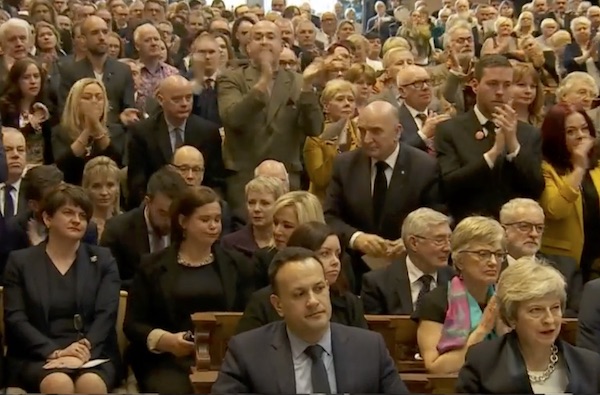
Political leaders in the North and the Dublin and London governments have been publicly humiliated by an angry condemnation from the pulpit at the funeral of journalist Lyra McKee, who died during a riot in Derry last week.
The service in Belfast’s St Anne’s Cathedral on Wednesday was packed with mourners, including an unprecedented turnout by British and Irish politicians, including the President of Ireland, the Taoiseach Leo Varadkar and British Prime Minister Therrsa May, and the leaders of the main northern political parties.
Parish Priest of St. John’s Parish Belfast, Fr Martin Magill, questioned why it took the death for politicians to come together to address the ongoing violence in the North.
The funeral saw friends and relatives of Ms McKee also issue impassioned appeals to Theresa May and the other politicians, urging them to convert the shock at her killing into action for change.
“Why in God’s name does it take the death of a 29-year-old woman with her whole life in front of her to get us to this point?” demanded Fr Magill.
His rebuke drew a burst of loud applause and a standing ovation from the mourners, while the assembled politicians responded with a sheepish clap.
It came as the mainstream media and political establishment depicted the tragedy as “evil murder” and refused to acknowledge the background to the events. But the two governments were clearly caught by surprise by the public display of public opinion at the funeral, and by Friday, talks which long appeared impossible had been hurriedly arranged.
The Six County Stormont Assembly collapsed in 2017 over corruption allegations and broad equality issues. Since then, the DUP’s grip over the Conservative party at Westminster has prevented political change in both London and Belfast.
Mr Varadkar and Mrs May in a joint statement released today [Saturday] said that they had “heard the unmistakable message to all political leaders that people across Northern Ireland want to see a new momentum for political progress”.
But there is no suggestion so far of a peace strategy to deal with the clashes in Derry, or related disturbances elsewhere. These included a very serious gun attack on the home of prominent Lurgan republican Colin Duffy, in an attack being blamed on loyalists.
The attack highlighted the disparity in how the main Irish and British media treat the actions of loyalist paramilitaries, who have carried out a number of targeted assassinations in recent years, against their calls for an aggressive campaign of oppression and censorship against the New IRA and Saoradh.
There has also been no sign yet that the discussions will consider recent breaches of the 1998 Good Friday Agreement by the British government, including the abandonment of the principle of consent in regard to EU membership; the threat of a reimposed customs border; or the cancellation of Irish citizens’ rights in the North.
The indications are the talks will instead aim to “fill the political vacuum” and shore up support for the main political parties.
Sinn Féin leader Ms McDonald welcomed the announcement of renewed talks, which are scheduled to take place in the short interval between the local and European elections, May 2 to May 23.
She said Fr Magill had “in a clear concise way said what I have heard all over Ireland – people want the Executive and the Assembly up and running, people want equality and they want good government they can have confidence in”.
She described the upcoming talks as “a test of whether the British government and the DUP are finally willing to resolve the issues of equality, rights and integrity in government which caused the collapse of the power-sharing institutions two years ago.”
She did not refer to a previous taks deal which fell apart in early 2018, but said the process should once again focus “on marriage equality, and rights for women, Irish speakers and victims.”
Speaking on RTÉ’s Morning Ireland, DUP leader Arlene Foster denied the death of Lyra McKee was a result of a “political vacuum”.
“That’s not to say that we (politicians) don’t bear responsibility because there is no Assembly,” she said. Fr Magill’s sermon had been “about what people want to see happening - power sharing and devolution. That’s why it’s important that we get back to the Assembly. To get it up and running again.”
![[Irish Republican News]](https://republican-news.org/graphics/title_gifs/rn.gif)
![[Irish Republican News]](https://republican-news.org/graphics/title_gifs/harp.gif)

